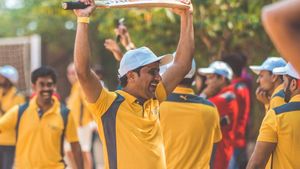Dr. Khalid Abu Amsha, a prominent professor of applied linguistics and expert on teaching Arabic to non-native speakers, underscored the pressing need for innovative knowledge transfer during the 10th Linguistic Council meeting last Wednesday at the Arabic Language Academy in Sharjah. During the council, which focused on the characteristics and traits of Arabic teachers for non-native speakers, Abu Amsha emphasized the importance of limiting teacher talk to merely 20% of class time, allowing ample opportunity for student engagement.
He stated, "Teaching is an ever-evolving process, and effective educators must share this learning experience with their students." With his dual roles as the Academic Director of the Qasid Institute and trainer at CESCO, he argued for the necessity of educators possessing extensive knowledge across various disciplines. His points echoed throughout the session, emphasizing the value of educators who can adapt to the diverse needs of their students.
Opening the meeting, Dr. Mohamed Safi Al Mosteghanemi, the Secretary General of the Arabic Language Academy (ALA), highlighted the unique role of non-native Arabic-speaking students. He remarked, "Non-native Arabic-speaking students are ambassadors of the Arabic language to the world," emphasizing their potential to showcase the language's beauty and complexity to new cultures. Al Mosteghanemi attributed this vibrant advocacy of Arabic to the leadership of His Highness Sheikh Dr. Sultan bin Muhammad Al Qasimi, who emphasizes the importance of Arabic both locally and globally.
He shared insights on how the Arabic language has historically been shaped by notable non-Arab scholars who uniquely contributed to the humanities and sciences, leaving indelible marks on history. "Remembering these achievements inspires current initiatives aimed at promoting Arabic through contemporary teaching methods," he added.
During the discourse, Dr. Khalid Abu Amsha detailed the specific initiatives undertaken by the UAE to bolster Arabic education. He introduced the National Arabic Language Document and the updated “Arabic Unites Us” series, asserting the importance of embedding such standards within educational frameworks. He pointed out several documents advocating for effective teacher preparation and continuous professional development. He insisted on the necessity of integrating these standards throughout educational goals and curricula to meet students' needs effectively.
Abu Amsha warned against the pitfalls of rote memorization, stating, "The most unfortunate result of traditional teaching methods is when students are made to memorize stagnant lectures, thereby stifling motivation and engagement within the classroom." He called for adopting task-based learning models connecting language education to students' everyday experiences. According to him, this approach enriches vocabulary acquisition and language structures.
Echoing this sentiment, Dr. Abu Amsha ended his session with a call for creativity within the production of Arabic textbooks. He suggested crafting engaging educational materials, challenging traditional frameworks: "It is necessary to develop innovative and unconventional titles for Arabic language books, like 'Arab Cities,' to present grammatical rules through engaging storytelling, capturing learners’ interest and making the learning experience worthwhile."
The discussions at the Arabic Language Academy underscored not only the evolution of teaching methods but also the central role educators play in fanning the flames of language appreciation among non-native speakers. With future events and classrooms to come, both Abu Amsha and Al Mosteghanemi set the tone for transformative educational practices aimed at nurturing and preserving the Arabic language's rich heritage.



